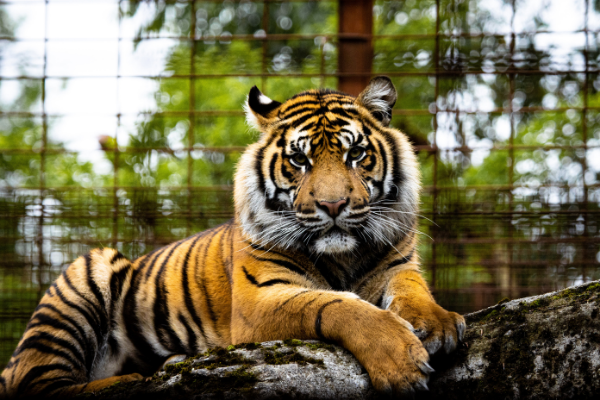India, the young Bengal tiger who went missing for a week in Houston in early May, is now safe in his new home at a Texas wildlife sanctuary. Soon, the thousands of other big cats kept as pets around the U.S. may have safer and more secure futures as well.
The Big Cat Public Safety Act was reintroduced in the US Senate on April 19, 2021. Championed by Senators Richard Blumenthal (D-CT), Susan Collins (R-ME), Tom Carper (D-DE), and Richard Burr (R-NC), the legislation would prohibit private individuals from possessing lions, tigers, leopards, cheetahs, jaguars, cougars, or any hybrid of these species. This prohibition would only apply to big cats kept as pets; sanctuaries, universities, and zoos would be exempt. Additionally, the bill would prohibit public petting, playing with, feeding, and photo ops with cubs.
“This bipartisan measure would help stop exploitation of big cats like tigers and lions, and reduce safety risks,” said Blumenthal in a statement issued by his office. “My Big Cat Public Safety Act would prohibit private ownership of these beautiful but powerful predators, which deserve to live in the wild. They should never be pets, even as cubs, kept in captivity dangerously for entertainment. I’m thankful for the groundswell of public support for this bill and look forward to working with my colleagues from both sides of the aisle to ensure it becomes law.”
Last year, the Big Cat Public Safety Act drew bipartisan support in the House of Representatives, which passed the measure on December 3 on a 272-114 vote, with 48 Republicans voting with Democrats to approve the bill.

In addition to being endorsed by Friends of Animals, The Big Cat Public Safety Act has been endorsed by other animal welfare groups and has the support of some law enforcement organizations, including the Fraternal Order of Police. Democratic Rep. Mike Quigley of Illinois, the bill’s main author, has said “too often, law enforcement and first responders are the ones who end up in danger from these animals and, in a time when our first responders are already facing increased risk from the pandemic, we owe it to them to limit the additional dangers they face on the job,” according to a CNN article published upon the bill’s passage in the House.
The Senate companion bill did not make it out of the Senate Environment and Public Works Committee by the end of the 2020 legislative session, hence the need to take up the legislation with the current session. The Senate’s reintroduction of the bill in April follows a similar action by the House in January.
Proponents of the ban against keeping these wild animals as pets have been striving to pass the act since 2017. The bill follows the passage, in 2003, of the Captive Wildlife Safety Act, which recognized that big cats did not belong in private hands. That legislation passed unanimously but had two loopholes big enough for a lion to jump through: It did not address ownership of big cats as pets by people who are not regulated by USDA as exhibitors. Second, it continued to allow rampant untracked breeding of cubs to be used for petting and photo ops by private operators and small-scale “roadside” exhibitors.
The problem, and the growing concern for protection of these animals, has been brewing for years. In 2011 the owner of a backyard menagerie in Ohio opened the cages of his tigers, leopards, lions, wolves, bears, and monkeys, then committed suicide. Local police, who were neither trained or properly equipped to deal with a situation of that magnitude, were forced to shoot and kill nearly 50 animals—38 of them big cats, according to BigCatRescue.org.
The debut of “Tiger King” on Netflix, which highlighted the machinations of “Joe Exotic”—an eccentric keeper of big cats in Oklahoma, drew further attention to the issue. The wanderings of India the Bengal Tiger in Houston is just latest incident to make national news.
As many as 7,000 tigers are kept as pets in the United States—that’s more tigers than currently inhabit all the wilds of Asia, says the Captive Wild Animal Protection Coalition. In all, there may be 20,000 big cats (principally tigers, lions, leopards and cougars), in U.S. homes, many, no doubt, living in conditions unsuitable for these wild animals.
“The only life for a big cat is to be free and living in the wild, certainly not kept as a pet, or prop, or as a breeding machine for profit,” says Priscilla Feral, president of Friends of Animals. “We salute Senator Blumenthal’s leadership on this issue and urge others to contact their Senators to vote to end this cruelty and exploitation.”
“This legislation is a win-win,” said Senator Tom Carper of Delaware. “It would prevent big cats from living in inhumane conditions and protect the public from the safety implications of these beautiful creatures being kept as pets.”

